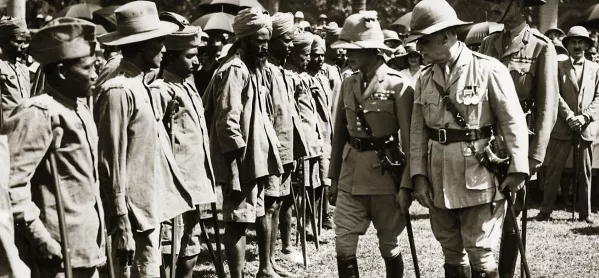- Home
- ‘We must teach the worst of British colonial history’
‘We must teach the worst of British colonial history’

I’m going to say it how it is: British people are hypocrites.
We refuse to learn other languages because “everyone speaks English”, we label ourselves expats whereas everyone else is an immigrant and we have the gall to complain about the number of said immigrants while happily devouring their food.
And we do all of this with absolutely no sense of irony.
But this isn’t our fault - not really.
Denied the chance to learn
We are consumed by a strange narcissistic arrogance, an entitlement that overshadows every aspect of our so-called Britishness and culture because of one thing: we have absolutely no idea about our history - our long, ruthless, colonialist history.
As a teacher of Bengali heritage, I have always had a problem with our out-of-touch national curriculums - they are biased, male-centric and let’s face it, mind-numbingly dull.
And this shows with how often teachers themselves are totally out of touch with why this matters.
The lack of knowledge about the realities of the British Empire among (predominantly white) teachers is shocking, but what is more outrageous is the apathy that comes from the education sector itself - it is this apathy that exemplifies systemic racism.
Weak attempts at engagement
There is time allocated in the academic calendar for such things as Black History Month, but it’s a poor substitute for properly engaging in this issue.
It usually starts off the same way: a lacklustre attempt at “history”, with a hastily downloaded and poorly researched presentation during assembly, followed by shoehorned lessons for which teachers have also done a quick google to try to make anything “black” relevant to their lessons.
Eventually, a student will point out that black history is all history, about which everyone will agree, and then we go back to learning about “real history” - you know, the whitewashed, Euro-centric one in which we focus on the Second World War and how we kicked the Nazi regime out of Europe.
We need to break this cycle of apathy and ignorance and ensure that never again do people have to march the streets in order to be heard. The only way us Brits can bring about this change is for teachers to teach British colonialism at secondary level.
Every last terrible bit of it. It is our duty to the rest of the world.
This is not a new argument.
From the likes of Stuart Hall, with his groundbreaking work on pigmentocracy, to bell hooks, who argued that feminist readings are often from white perspectives, scholars have always pointed out the failings within our educational systems and how often history is taught with a Euro-centric bias.
And yet, here we are, still arguing about the same thing.
Shutting down debate
A large part of this stems from the political system, where any attempt to raise the idea there are negative areas of British history that need teaching are dismissed with a sneer and, worse, a claim of hating your country.
For instance, when in 2018 Jeremy Corbyn rightly proposed it was necessary to “teach the history of people of colour as components of, and contributors to, British nation state - rather than as enslaved victims to it, because black history was British history,” he was dismissed without any attempt to consider the merits of what he was saying.
Conservative MP Tim Loughton accused Corbyn of being “ashamed” of his own country, and the ever-patriotic Jacob Rees-Mogg claimed that although there were “blots” on British colonial history, it did have some “good bits”.
Perhaps the blots he was referring to were the small issues of partition and slavery?
The reaction reflects a wider and deeply held social view that examining our past will make us ashamed and that shame will make us hate our own nation.
I am not a master of logic, but even that justification seems flimsier to me than going for a long drive to test your eyesight.
We have to change
We cannot begin to understand the complexities of racism and identity - and even Britishness - without examining British colonialism.
We cannot take pride in the state of our nation without acknowledging all the broken backs and necks we stepped on to get to the heights we are at now.
We cannot call ourselves a developed nation when we are yet to develop an iota of conscience.
And if us Brits really are that embarrassed by our history, maybe that is not such a bad thing.
Maybe it is the perfect starting point.
Shanara Ali is a secondary school teacher specialising in English and media. She works in London and tweets @ShanaraAli
Keep reading for just £1 per month
You've reached your limit of free articles this month. Subscribe for £1 per month for three months and get:
- Unlimited access to all Tes magazine content
- Exclusive subscriber-only stories
- Award-winning email newsletters